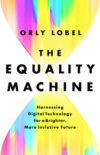Dec 16, 2022
How much does the general public really trust tech? Despite increased scrutiny and critique of digital platforms, renowned tech policy scholar Orly Lobel defends digital technology, including AI, as a powerful tool we can harness to achieve equality and a better future.
Lobel recognizes the criticism of big data and automation, and she does not refute the many challenges that technology presents — but at the same time, Lobel encourages us to improve it. We cannot stop technological development, Lobel argues, but we can direct its course according to our most fundamental values.
In The Equality Machine: Harnessing Digital Technology for a Brighter, More Inclusive Future, Lobel presents evidence that digital technology frequently has a comparative advantage over humans in detecting discrimination, correcting historical exclusions, subverting long-standing stereotypes, and addressing some of the world’s complex problems: climate, poverty, injustice, literacy, accessibility, speech, health, and safety.
Lobel offers insights in each chapter that tackle everything from labor markets to dating markets, revealing just how much of our lives can be changed — and in her view, improved — via technology. Through analysis and storytelling, The Equality Machine promises to add to the robust, ongoing debate about technology and serves as a call to restore human agency over our own values.
Orly Lobel is the Warren Distinguished Professor of Law and Director of the Center for Employment and Labor Policy at the University of San Diego. She is the recipient of prestigious research grants, member of the American Law Institute, a former Israeli military data analyst and Supreme Court clerk, and regularly consults governments and industry on law and technology. An award-winning writer, she is the author of You Don’t Own Me and Talent Wants to Be Free.
Beverly Aarons is a writer, artist, and game developer. She works across disciplines exploring the intersections of history, hidden current realities, and imagined future worlds. She is the winner of the Guy A. Hanks & Marvin H. Miller Screenwriting Award, Community 4Culture Fellowship, Artist Trust GAP Award, 4Culture Creative Consultancies Award, and the Seattle Office of Arts & Culture smART Ventures grant. She’s currently publishing in-depth artist profiles at Artists Up Close on Substack.




